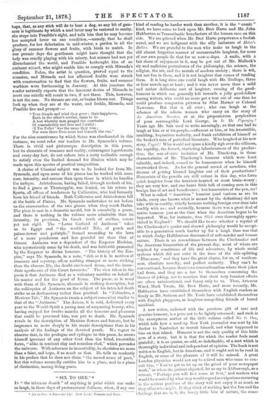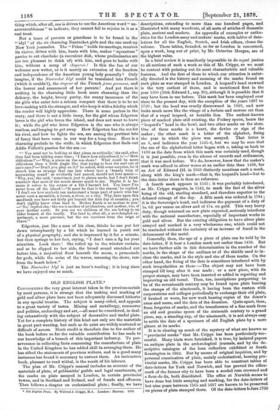" SIX TO ONE." * " the inhuman dearth "
of anything in print which can make us laugh, in these days of preternatural dullness, when, if any one
* Sis to One : a Nantucket 141. New York: Putnam and Sons.
kind of reading be harder work than another, it is the " comic " kind, we have come to look upon Mr. Bret Harte and Mr. John Habberton as Transatlantic benefactors of the human race on this side. We are grieved when Mr. Bret Harte perpetrates a foolish novel, and we are indignant with the silly imitators of Helen's Babies. We are grateful to the men who make us laugh in the old almost forgotten manner of unreasonable laughter, for none of our own people do that for us now-a-days. A smile, with a fair share of enjoyment in it, may be got out of Mr. Mallock's sly and malicious portraitures of the philosophy, the science, the religion, the art, and the morals of modern society ; there is wit, but not fun in them, and it is not laughter that comes of reading them. It is long since one could laugh with Mr. Trollope, three or four novels ago at least ; and it was never more than a mild and rather deliberate sort of laughter, coming of the good- humour in which one generally felt towards a jolly good-fellow among writers, who could no more get a tear out of one than he could produce companion pictures to Silas Marner or Colonel Newcome. But that is all over ; who can laugh at the schemes of the odious women who carry on the story of An American Senator, or at the preposterous perplexities of poor contemptible Lord George, in Is He Popenjoy ? Years ago Mr. Sala used to write amusingly, so that one had to laugh at him or at his people,—oftenest at him, at his irresistible, rambling, loquacious audacity, and frank exhibition of himself as the broker's man of periodical literature. Who laughed at his new story, Cupid ? Who would not spare a kindly sigh over the silliness, the vapidity, the forced, chattering laboriousness of the produc- tion, the out-of-date imitation of Mr. Thackeray, in those characteristics of Mr. Thackeray's humour which were least valuable, and indeed, ceased to be humourous when he himself overworked them. As for the general crowd of novelists, who dreams of getting blessed laughter out of their productions ? Humorists of the pencils are still extant in this day, who force quick laughter from the heaviest-hearted or most brain-weary ; they are very few, and one hears little talk of coming men in this benign line of art and beneficence; but humourists of the pen, no!
What is called " American" humour (and various as are its kinds, every one knows what is meant by the definition) did not take with us readily, chiefly because nothing foreign ever does take readily with us ; and secondly, because there was a great deal of native humour just at the time when the American began to be imported. Was, for instance, Sam Slick ever thoroughly appre- ciated in England ? We should like to see whether a reprint of the Clockmaker's quaint and shrewd philosophy would be accept- able to a generation much harder up for a laugh than was that to which Judge Halliburton discoursed of soft-sawder and human nature. There is no resemblance between the Clockmaker and the American humourists of the present day, most of whom are inspired by conditions of life and adventure, by whole social systems which did not exist in the time of the side-splitting "Blue-nose," and they have the great charm, for us, of rootless- ness, absolute novelty; and perfect audacity. They can't be conventional, because there's no conventionalism where their jokes hail from, and they are a law to themselves concerning the themes of joking, not to mention that their very funniest effects are often unintentional, and funny only to us. Thus, Artemus \Vard, Mark Twain, Mr. Bret Harte, and more recently, Mr. Habberton have established themselves with English readers as firmly as Mr. Sothern and Mr. Toole have established themselves with English playgoers, as laughter-compelling friends of bored mankind.
A new writer, endowed with the precious gift of rare and genuine humour, is a prize not to be lightly esteemed; and such is the anonymous author of the little volume called Six to One, which tells how a used-up New York journalist was sent by his doctor to Nantucket to recruit himself, and what happened to him on that island. Humour is not the only quality of this little gem of a story, but it is that for which the reader feels most grateful ; it is so quaint, so odd, so indefinable, of a sort which is thoroughly individual and independent of opinion. The book is not written in English, but in American, and it ought not to be read in English, or some of the pleasure c:f it will be missed. A great London physician would not say to a tired man who came to con- sult him, " You've got to let up on the grind of your newspaper work," or when the patient objected, let us say to Aldhorough, as a retreat, " Perhaps you will fret some at first," and readers who would be worried by what they would regard as vulgarisms occurring in the serious portions of the story will not enjoy it as much as they otherwise might. If they think of nothing but the fun and the feelings that are in it, the lovely little bits of nature, the some-
thing which, after all, one is driven to use the American word " un- accountableness" to indicate, they cannot fail to rejoice in it as a real treat.
Not a trace of parents or guardians is to be found in the " idyl " of the six charming Nantucket girls and the one used-up
New York journalist. The "Prism " holds its meetings, receives its visitor, drives with him, boats with him, makes " squantum" parties to eat clambake (a succulent dish, whose preliminaries are not too pleasant to think of) with him, and goes to bathe with him, without a scrap of chaperon ! Is this the fun of our welcome new writer, or is it merely an extension of the freedom and independence of the American young lady generally? Only imagine, if the Nantucket Idyl could be translated into French (which it couldn't), the stupeur of the French jeune personne, and
the horror and amazement of her parents ! And yet there is nothing in the charming little book more charming than the delicacy, the bright, breezy purity, the sunny innocence of the six girls who enter into a solemn compact that there is to be no love-making with the stranger, and who keep it with a fidelity which the reader will highly appreciate. There is some pathos in the story, and there is not a little irony, for the girl whom Edgerton loves is the girl who loves the island, and does not want to leave it ; while the girl who loves Edgerton is the one who is always restless, and longing to get away. How Edgerton has the sea for his rival, and how he fights the sea, are among the prettiest bits of fancy that have come in our way for a long time. Here is a charming prelude to the strife, in which Edgerton first finds out Addle Follett's passion for the sea :-
"' You need not be looking at that piano so critically,' she said, after
they bad been talking some time ; ' I know how ridiculous it How
ridiculous Why, a piano on the sea-shore What could be more ridiculous than a little jingle like that trying to beat the surf out of one's ears ?'—' Don't you play on it?' he asked, with some surprise, for it struck him as strange that one into whose face a beauty born of murmuring sound' so evidently had passed, should not love music.— 'Why, yes,' she said, ' sometimes, just to please uncle, but I don't think somehow that most of the music means much to me. Maybe it is be- cause it refers to the scenes of a life I haven't led. You know I've never been off the island.'—' It must be that is the reason,' he replied. I don't see how anybody can understand a large part of music who has never seen a mountain, a forest, a river or a city. Why, here upon this sandbank you have not fairly got beyond the first day of creation ; you don't rightly know what land is. Mother Earth is no mother to you.' —' No,' replied she, the sea is mother of us islanders, and mother, too, of your mother earth. So you see we children of the sea belong to an elder branch of the family. The land is, after all, a new-fangled ex- periment, a more parvenu, but the sea survives from the reign of chaos.'"
Edgerton, just like a man of his class, thinks he can put her down triumphantly by a bit which he learned in youth out of a physical geography, and she is impressed by it for a minute, but then springs to her feet, crying, "I don't care a fig for your scientists. Look there ! She rolled up to the window curtain, and as he slipped to her side, the broad sound stretched out before him, a majestical floor beneath the moon, a promenade for gods, while the noise of the waves, caressing the shore, rose from the beach below."
The Nantucket idyl is just an hour's reading ; it is long since we have enjoyed one so much.































 Previous page
Previous page